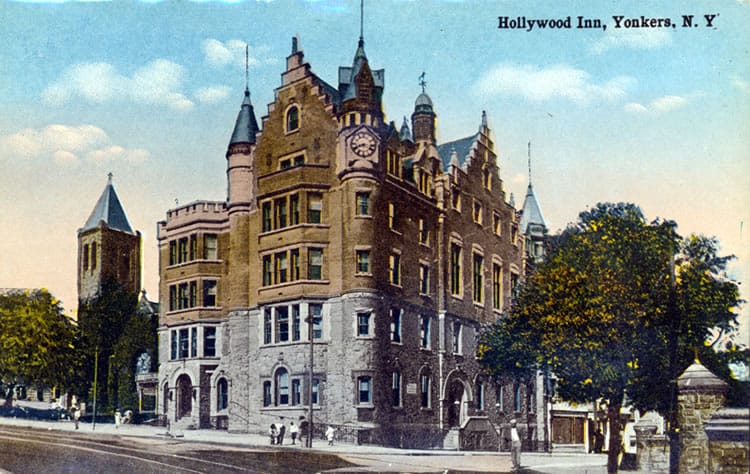By Mary Hoar, President Untermyer Performing Arts Council, President Emerita the Yonkers Historical Society

Monday, June 22nd
June 22, 1907: Mrs. Alexander Smith formally laid the cornerstone of the Sprain Ridge Hospital Administration Building. The hospital, founded by Alexander Smith Cochran, was created to treat tuberculosis. Other speakers were Thomas Ewing, Dr. William Sherman, and Mayor John Coyne, who expressed the gratitude of the citizens of Yonkers.
June 22, 1918: Chairman of the Yonkers National War Savings campaign Alfred McCann announced that Yonkers would no longer use the yellow or “Pro-German” cards. He stated the card was not “abandoned because it was not properly designed by the government to separate the loyal from the disloyal in certain doubtful districts, but because it is believed it does not apply to a city that stands foremost in the Nation with an oversubscription of 252% to its credit.” Anyone who did not sign a white card promising to purchase war stamps regularly was issued a yellow card and labeled as a traitor or pauper. Leading citizens such as Hampton Ewing and Judge Webster Thayer denounced this intimidation technique.
Tuesday, June 23rd
June 23, 1780: Grenadier and English regiments pitched camp at the Philipse house
June 23, 1906: The Hollywood Inn opened its roof garden; highlight of the garden were soft drinks, ice cream and outdoor furniture.
June 23, 1927:After receiving a legal opinion that the proposition to changed the length of Yonkers’ elected offices from two to four years did not require a referendum vote, Mayor William Walsh sent the proposal to the Common Council with his approval.
Wednesday, June 24th
June 24, 1919: Ellen Cox Ewing, wife of Civil War General Thomas Ewing, passed away at home on Belmont Terrace. Before the war, General Ewing had been the Chief Justice of Kansas. Active in community affairs and connected to the Homeopathic Hospital and Maternity since its inception, Mrs. Ewing serving as Hospital President for many years. Her son Thomas married Anna Cochran, daughter of carpet shop heiress Eva Smith Cochran.
June 24, 1929: Sir Mortimer Singer, High Sheriff of the County of Berkshire, passed away in London. Son of Isaac Merritt Singer, inventor of the Singer sewing machine, he was born in Yonkers on July 25, 1863. He studied at Cambridge, was one of the earliest pilots in England and earned an Aviator’s Certificate on the biplane. He became a British citizen in 1900 and was created a Knight of the British Empire in 1920.
Thursday, June 25th
June 25, 1942: Additional guards were placed at all Yonkers and New York City water systems in our city; a team of eight Nazi saboteurs was captured on Long Island, with a second group still loose. Their targets were hydroelectric plants, factories, railroad tracks, bridges, and the New York City water system. Found guilty after their trial, six were electrocuted at the District Jail in Washington. The other two cooperated and later were deported to Germany.
July 25, 1943: The “Section Five Club,” Yonkers Giants fans who regularly attended games at the Polo Grounds sitting in Section Five, actually got to play on the field! While their favorite team was playing out of town, Giants officials allowed them to use the grounds for a picnic. The highlight of the afternoon was a game between the Section Fivers, wearing the Giants home game uniforms, and the Captain Edward Grant Post, American Legion, a post named after the former Giants third baseman killed in action during World War I. After seven innings, with a score of 21-21, the game was called on account of… food!
Friday, June 26th
June 26, 1926: Federal agents seized 1,833 quarts of whiskey, 221 quarts of gin, one case of champagne, 109 gallons of wine and 305 gallons of assorted spirits worth $25,000 from a house on Buena Vista Avenue.
June 26, 1926: The Chamber of Commerce announced it had given up on the plan to build a hotel at South Broadway near Morris Street as it only raised one-third of the needed 1.5 million dollars for the project. They refunded the $500,000 raised, and hoped private money would build a hotel in the city. The Chamber wanted to recapture money being spent for Yonkers events held in New York City hotels.
Saturday, June 27th
June 27, 1897: Sir Arthur Conan Doyle thanked John Kendrick Bangs for dedicating his book, The Pursuit of the Houseboat,” to him. Bangs’ dedication read, “To A. Conan Doyle, with the author’s sincerest regards and thanks for the untimely demise of his great detective, which made these things possible.”
Doyle responded, “How very good of you to inscribe your most amusing and original book to me! I begin to have hope of immortality now that I have got onto your flyleaf. With all kindest remembrances to you and yours, Ever truly yours, A. Conan Doyle.” An intriguing postscript was added: “I still live in hopes of playing round the Yonkers links once more.” Doyle gave no indication to which Yonkers’ fine golf course he referred.
June 27, 1944: Yonkers Marine and Quartermaster Sergeant Hubert Lloyd of Caryl Avenue received cigarettes supplied by the “Yonkers Cigaret Fund” while in the South Pacific; he promptly write to City Clerk Francis Heafy, his Caryl Avenue neighbor and Chairman of the fund. He said, “It might interest you to know the fine record shown by labor and industry there (Yonkers), a record which tops the entire Country, is greatly appreciated out here… it is, indeed, heartening to know that your home town is in there pitching.”
Sunday, June 28th
June 28, 1885: Yonkers carpenter John Platt, working in Santo Domingo, was staying at the Hotel San Pedro, the same hotel as exiled former President Sesario. Local authorities believed Sesario wanted to overturn the government and tried to arrest him, but he escaped during the shoot out. Platt stepped into the hall to see what was happening, and was shot by officers who mistook him for the ex-President. Platt’s wife and children had sailed for New York on the steamer G. W. Clyde a few days earlier; Platt was scheduled to sail home the next day.
June 28, 1936: Yonkers resident Earl Browder was nominated to run for President; his running mate was James W. Ford of New York City. Ford was the first African-American to run on a presidential ticket in the twentieth century.
For more information on the Yonkers Historical Society, Sherwood House and our upcoming events, visit our Facebook page at www.facebook.com/YonkersHistoricalSociety. For information on membership in the Yonkers Historical Society, please call 914-961-8940 or email yhsociety@aol.com.





